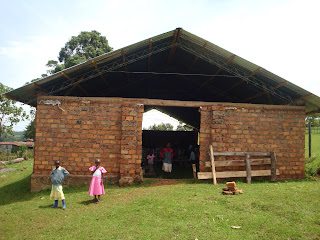Sometimes I feel like we have just enough technology and resources here to put us in difficult situations. (The corollary being that we have just enough to save some lives, as well.) The same situation as above occurs here at Tenwek, but it is made quite a bit more difficult due to a number of key differences.
First, our patients are more often younger, and had often been previously healthy, compared to similar cases in the US. It's never easy to say goodbye, but here the preparation time is often minimal.
Second, despite this minimal preparation time, we often need to move faster on these decisions than in the US. We have a 6-bed ICU which is almost always overloaded, and (at most) 4 functioning ventilators at any given time. If it is evident that a ventilated patient will not get well, then we (the care providers) would hate to miss the opportunity to use that ventilator for a new patient that comes in with a much better chance of survival. Waiting until everyone feels very comfortable is a luxury not made for the poor or those with limited resources. It is, at times, the comparison of one person's life for another.
Third, there is a general sentiment in the US of "I don't want to be a 'vegetable', and I'm sure my loved one wouldn't, either." Though this feeling may be quite vague sometimes, it often ends up guiding decisions for patients and families. Our patients here have never even thought of the possibility of long-term life-support, and the concept is rather lost on them. Even trying to get them to understand that brain death is irreversible is most often answered with "maybe we can just wait longer and see what happens". Much more than in the US, withdrawing a ventilator is seen as taking their life.
Lastly, decisions take time here. This is not a bad thing. It involves a lot of people in the process, and is just part of life. But it is a challenge. Thus, a conversation about withdrawing care is most often concluded with a decision to go and speak with ALL the other family members, some of whom usually have not arrived at the hospital yet. And won't for several days, perhaps.
Universally, doctors don't like having these conversations either, and so we delay talking about it until it seems that it can't be put off. Then the family can't be found at the right time. Then they are found. We have a very long and difficult conversation. They request more time to discuss with multiple other family members who are not at the hospital yet. Then we reconvene, and they request more time to see how the patient will do. Eventually we make a decision.
Part of the difficulty is that, who knows, maybe someone will make a great turn around. I may know more about the odds than the family, but they are almost always odds, albeit often extreme ones. However, I'm convinced that, in our situation, holding on forever is not the best way to steward the family's or the hospital's resources. We make tough decisions. More than that, we make awful decisions. Simply awful. But it doesn't mean that we shouldn't make them. It's just hard.































